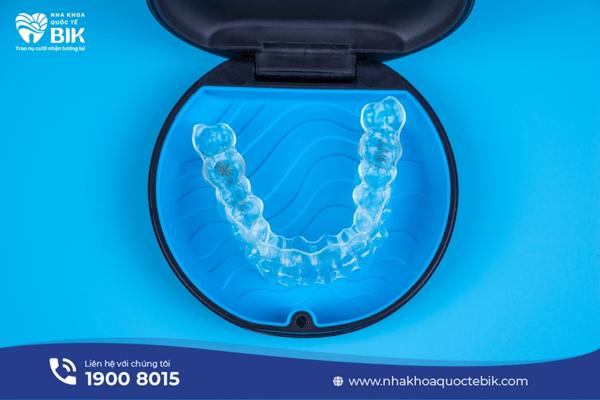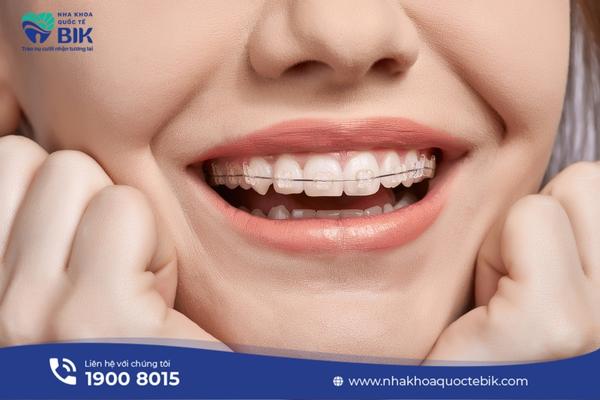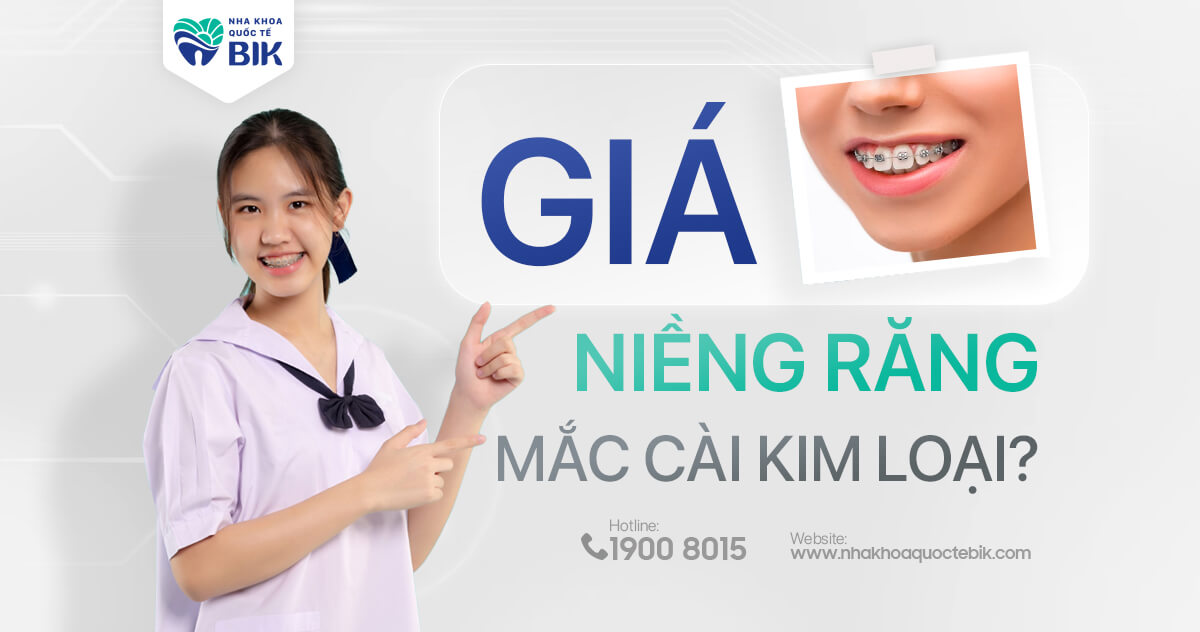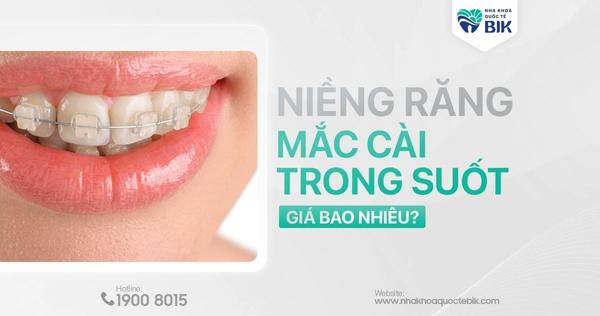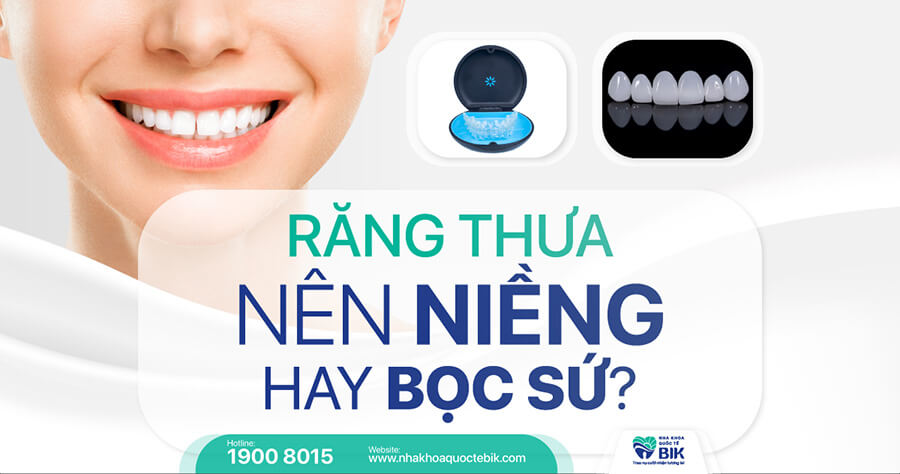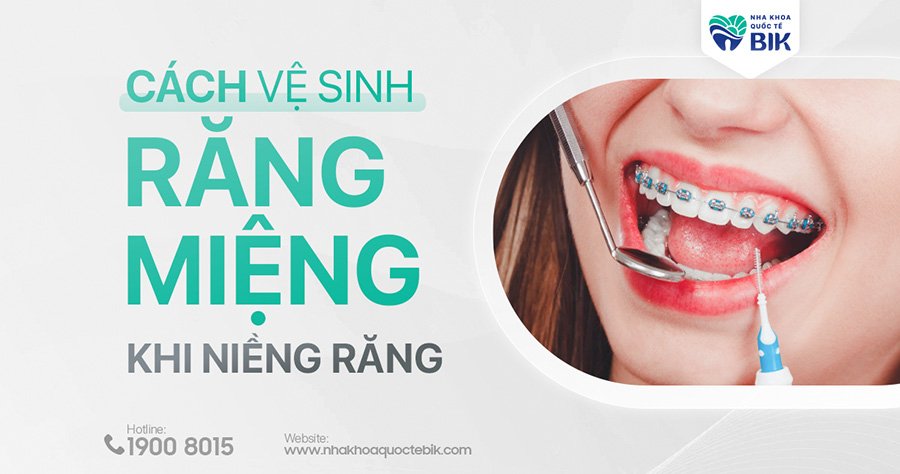Experience with braces is the topic that many people who participate in braces share the most on the Orthodontic Diary community groups because practical experiences will help those who want to have braces reduce anxiety and confusion. Today, the article below from BIK International Dental Clinic will explore more deeply the experiences when having braces…
Experience with braces 1: Age at which braces can be used
Age at which children should have braces (8 – 10 years old)
This is the ideal time for braces for children, this pre-orthodontic stage helps to promptly intervene in problems with misaligned teeth, guiding the development of the first permanent teeth in the correct direction. At the same time, it makes the orthodontic process easier during the growth stage.
The age for braces during the growth stage (12 – 18 years old)
Between the ages of 12 – 18, children are in the growth stage, their teeth and jaw bones are still soft, so they can be easily corrected without pain and without the need for tooth extraction. Braces at this age can be more economical than when you are over 30 because you do not need to use many supporting devices and the treatment time is also shorter.
Braces experience 2: Choose a reputable dental clinic
To choose a reputable dental clinic, you need to carefully research information about the dental clinic you want to choose and should not decide based on emotions, but need a set of important criteria to choose a quality dental clinic.
The dental clinic must have a license to operate from the Department of Health.
The dental clinic needs to have a team of doctors who are specialized in braces, have a lot of experience and have performed many successful braces.
The dental clinic has successfully braced many customers and received many positive reviews about the quality of service and treatment.
The dental clinic needs to own modern, specialized equipment for braces to ensure ensure accurate diagnosis and minimize treatment time.
The dental clinic must have a commitment contract and be responsible for the treatment results.
Customer care services must be guaranteed in quality.
The dental clinic must have an installment payment policy and support customers when needed.
In Ho Chi Minh City, BIK International Dental Clinic is a known address for its expertise in braces, fully meeting the 07 important criteria when you are looking for a reputable dental clinic.
Experience with braces 3: Painful stages when wearing braces
Painful stages when wearing braces often include: Pain when placing rubber bands, pain when pulling teeth, pain when tightening teeth and pain when wearing braces.
Pain when placing rubber bands
Separation is the first step when starting the braces process, the doctor will place a high elastic band su between two teeth, usually teeth 6 – 7 to create a small space. Then, the doctor will place the separator and start pulling the braces. During this stage, there is not much toothache, but the feeling of tension is quite uncomfortable. To reduce pain, you can take painkillers as directed by the doctor, eat soft foods, limit strong chewing and avoid impact on the separator area.
Pain after tooth extraction
As mentioned above, when braces are applied, you may need to have teeth extracted to create space for tooth movement on the jaw. After tooth extraction, the doctor will inject an anesthetic and after the anesthetic wears off, the tooth extraction site will be painful. During this time, you can take painkillers but avoid strong impact on the newly extracted site for about 3 – 5 days. After that, the extraction site will gradually heal.
Pain when tightening teeth
When wearing braces, you need to adhere to tightening teeth regularly once a month, or about 3 – 4 weeks/1 time. In the first days after tightening teeth, you may feel pain, so eat soft and easy-to-chew foods within 1 – 3 days. Avoid using force to tear food in the first days after tightening new teeth, as this can damage the teeth or cause them to move from the new adjusted position.
Pain when wearing appliances
During the process of braces, the appliances commonly used are jaw expanders or miniscrews. These appliances can cause discomfort or pain at first, especially when using jaw expanders. To minimize this feeling, you need to cut your food into small pieces and avoid eating hard foods that can cause difficulty in swallowing to avoid hitting the jaw expansion. In case the jaw expansion causes pain and damages the tongue, you can use painkillers as prescribed by your doctor or consult your doctor to effectively relieve pain without affecting the braces process.
Braces Experience 4: Care after tooth extraction
Depending on the condition of each tooth, there are different indications for tooth extraction. Some people only need to have 1-2 teeth extracted when wearing braces, while others need to have 6-8 teeth extracted to adjust their teeth.
After tooth extraction, you need to note the following:
- Do not use salt water or mouthwash.
- Do not clean or brush your teeth in the area where the tooth was just extracted.
- Avoid eating foods with debris to avoid inflammation, swelling, and pus at the extraction site.
- Use pain relievers as prescribed by your doctor.
- Eat soft, easy-to-chew foods.
- If you experience pain and swelling, you can apply ice to the cheek near the extraction site.
Braces Experience 5: Eating and Drinking
When wearing braces, is eating and drinking difficult? There are two common views: one is that you can eat anything without any problems when wearing braces and the other is that you need to pay attention and abstain from eating and drinking. However, based on the practical experience of many people who have worn braces, when eating and drinking, you need to cut food into small pieces to make it easier to chew, especially on the days when teeth are tightened or extracted, you should eat soft, liquid foods. Supplement adequate nutrition to avoid weight loss when wearing braces.
Braces Experience 6: Oral hygiene
Not everyone knows how to properly clean their teeth while wearing braces. BIK International Dental will guide you on how to brush your teeth properly, follow these steps.
Step 1: First, take a sufficient amount of toothpaste on the toothbrush and prepare a glass of warm water or water at a moderate temperature.
Step 2: Place the toothbrush at a 45-degree angle, so that the head and bristles come into contact with the teeth and gums.
Step 3: Brush vertically on the front and inside of the teeth.
Step 4: Place the toothbrush perpendicular to the chewing surface, brush gently in a circular motion from back to front.
Step 5: Remove bacteria that cause bad breath by brushing your tongue, you can use a toothbrush or a specialized tool.
Step 6: Rinse your mouth and brush your tongue. Then, wash the brush and leave it in a dry place.
Braces Experience 7: Reduce pain when soft tissue is scratched
During the process of wearing braces, you may encounter problems such as braces coming loose, toothache or soft tissues in the lips, cheeks, gums rubbing against the braces… Don’t worry too much, these are just common problems that anyone wearing braces will encounter, learn how to handle them to solve them right away.
Braces Experience 8: Handling when braces fall off
When wearing braces, it is inevitable that braces fall off, many inexperienced people often worry when this situation occurs. Don’t worry too much, the solution is quite simple, just keep the fallen braces, then contact your dentist to make an appointment to reattach them. To avoid this situation, you should also eat slowly and carefully, cut food into small pieces before eating.
Braces experience 9: Notes after attaching the separator
Placing the separator is an important step at the beginning of the braces process, often causing anxiety and discomfort for the braces wearer. To minimize discomfort, you need to follow these instructions:
- Do not remove the separator yourself.
- Prepare soft foods, chew slowly and gently.
- If you feel a lot of pain, you can use pain relievers.
- Brush your teeth carefully and gently. Use a water flosser to clean between your teeth, but avoid dropping the separator.
- In case the separator falls out or breaks before the appointment date, contact the Dental Clinic immediately to reschedule the appointment, to avoid affecting the braces process.
Braces Experience 10: Notes after lifting the joint
The adjustment of the joint lift will directly affect the eating process, so the doctor recommends that:
- Eat soft foods that are easy to chew and swallow, avoid hard foods to avoid damaging the joint lift.
- In case the joint lift is damaged or worn, contact the clinic for instructions and support.
- The joint lift process can last from 3 to 12 months depending on the degree of misalignment of the bite. After that, the doctor will remove the joint lift when there is a relative change in the bite between the two jaws.
Braces Experience 11: Notes when wearing intermaxillary elastics
When it comes to wearing dental braces, you need to follow these rules:
- Wear elastics correctly and according to the schedule prescribed by your doctor. To avoid forgetting, take a photo of the position and how to wear the elastics.
- Remove elastics when eating and drinking and cleaning your teeth.
- Bring a spare elastic when going out to avoid losing or damaging the elastics you are using.
- Wash your hands thoroughly before wearing or removing intermaxillary elastics.
- Do not open your mouth too wide when wearing elastics because it can cause the elastics to lose their elasticity, easily break and fall into your mouth.
- Do not wear many elastics at the same time because this can have a negative effect on the teeth. Store elastics carefully, avoid placing them in humid places and direct sunlight.
Braces experience 12: Notes after inserting minivis
In the first few days after inserting minivis, you may feel uncomfortable due to the lips and cheeks being uncomfortable. Here are some important notes:
- Use dental wax or cotton to cover the minivis.
- Choose soft, liquid foods such as porridge, soup, cereals, vegetables, and tubers to avoid affecting the minivis area.
- Avoid chewing tough, hard foods in the minivis area.
- Clean your teeth gently to avoid damaging the minivis area.
- Rinse your mouth with warm salt water to clean the oral cavity and prevent bacteria from causing inflammation.
- If there is swelling or discomfort, you can apply ice packs or take pain relievers. Symptoms will decrease after a while.
- In case of infection or loose or fallen minivis, contact the dentist for support.
This is the experience of braces from doctors and experts at BIK International Dental Clinic. For more detailed advice, please call hotline 1900.8015 for support!

